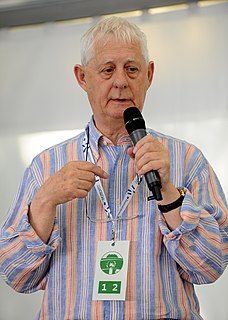A Quote by Martin Heidegger
Time is not a thing, thus nothing which is, and yet it remains constant in its passing away without being something temporal like the beings in time.
Related Quotes
Everything is in constant flux on this earth. Nothing keeps the same unchanging shape, and our affections, being attached to things outside us, necessarily change and pass away as they do. Always out ahead of us or lagging behind, they recall a past which is gone or anticipate a future which may never come into being; there is nothing solid there for the heart to attach itself to. Thus our earthly joys are almost without exception the creatures of a moment.
What differentiates time from space is that time does have a direction. In that sense it is different from space. I think that's certainly true that whereas spatial dimensions don't have direction or an arrow, time does. It runs from past to future. But I see that arrow of time as rooted in a deeper metaphysical reality, namely the reality of temporal becoming - of things coming to be and passing away. That is why time has this arrow. But it's not sufficient to simply say that time and space are distinct because time has a direction. The question will be: why does it have a direction?
We're living in world, stars and dust Between heaven 'n all that surrounds us We're travellers here, spirits passing through And the love we give, is all that will endure Just like a rose after the rain Something beautiful remains Tears will leave no stains Time will ease the pain For every life that fades Something beautiful remains
In nature nothing remains constant. Everything is in a perpetual state of transformation, motion, and change. However, we discover that nothing simply surges up out of nothing without having antecedents that existed before. Likewise, nothing ever disappears without a trace, in the sense that it gives rise to absolutely nothing existing in later times.
Do you want to improve the world? I don't think it can be done. The world is sacred. It can't be improved. If you tamper with it, you'll ruin it. If you treat it like an object, you'll lose it. There is a time for being ahead, a time for being behind; a time for being in motion, a time for being at rest; a time for being vigorous, a time for being exhausted; a time for being safe, a time for being in danger. The Master sees things as they are, without trying to control them. She lets them go their own way, and resides at the center of the circle.
Love, being in love, isn’t a constant thing. It doesn’t always flow at the same strength. It’s not always like a river in flood. It’s more like the sea. It has tides, it ebbs and flows. The thing is, when love is real, whether it’s ebbing or flowing, it’s always there, it never goes away. And that’s the only proof you can have that it is real, and not just a crush or an infatuation or a passing fancy
Both life and death manifest in every moment of existence. Our human body appears and disappears moment by moment, without cease, and this ceaseless arising and passing away is what we experience as time and being. They are not separate. They are one thing, and in even a fraction of a second, we have the opportunity to choose, and to turn the course of our action either toward the attainment of truth or away from it. Each instant is utterly critical to the whole world.





































